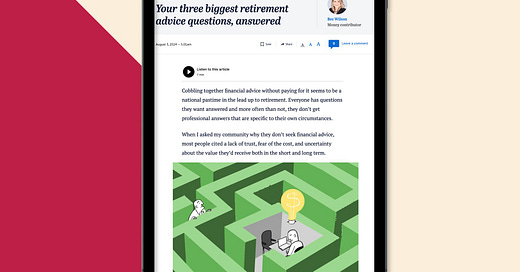
Discover more from Epic Retirement Australia
Your three biggest retirement advice questions, answered
Cobbling together financial advice without paying for it seems to be a national pastime in the lead up to retirement.
In this edition
A shorter newsletter this week. But I’m lining up a special feature next week - a huge one! So hold your breath for it.
The Age/Sydney Morning Herald: Your three biggest retirement advice questions answered
From Bec’s Desk: Writing writing writing.
Prime Time: Your biggest questions answered by a financial adviser
Extract of article published in The Age, The Sydney Morning Herald, Brisbane Times, WA Today on Sunday 4th August 2024.
Your three biggest retirement advice questions, answered
Cobbling together financial advice without paying for it seems to be a national pastime in the lead up to retirement. Everyone has questions they want answered and more often than not, they don’t get professional answers that are specific to their own circumstances.
When I asked my community why they don’t seek financial advice, most people cited a lack of trust, fear of the cost, and uncertainty about the value they’d receive both in the short and long term.
Despite these concerns, they still have questions and want answers. So, this week, I crowdsourced the biggest financial questions from The Epic Retirement Club Facebook Group, ranked them by popularity, and prepared factual, education-based answers to the top three.
I threw the top six questions at fellow columnist and financial adviser, Paul Benson this week in the Prime Time podcast too - so you can hear a different perspective here.
So, let’s unpack the three most popular questions in detail.
1. What is considered a reasonable annual fee to see a reputable financial adviser?
This is a question that most advisers answer, to my great frustration, with the answer, “it depends!” And, fact is, it does depend on quite a few different variables.
It depends on why you want advice – and whether you’re looking for advice to address a single issue, or advice to review your whole financial situation and tell you what you can do. It also depends how complex your situation is, how much work is involved in delivering your statement of advice, and on the investment strategies that will be implemented as a result of the advice.
Advertisement
Talking to advisers, the cost of independent advice is usually broken down into three bands within their firms:
Simple advice: This involves addressing a single issue or a straightforward financial situation that needs clarification. The cost for this type of advice typically ranges from $1500 to $3000 upfront.
Complex advice: This is the most common type of advice for people who have a significant life event and want to understand the impacts, if they don’t have complex investments and structures. The usual cost is between $3000 and $5000.
Comprehensive advice: This offers an in-depth analysis of all aspects of your complex finances, goals, and future plans. Expect to pay between $5000 and $10,000, depending on the complexity and the adviser’s expertise.
Then you need to consider the ongoing cost of implementing the advice, which could include an ongoing advice fee of 1 per cent to 1.5 per cent for the adviser, plus 0.5 per cent for investment platform fees, and 1 per cent to 1.5 per cent for funds management fees if you enter into managed investments.
Some advisers, not all, will offer the upfront advice for free if you take up an ongoing advice service. It’s also worth pointing out that if you’re with a major superannuation fund, you’re probably already paying for access to superannuation financial advice in your annual member fees.
In addition to this, some funds charge a small fee for retirement advice services for members to set up their strategies for combining the age pension with an account-based pension and putting it all in place. This can be a suitable option if your needs are simple, you are happy with your fund’s fees and performance and don’t need a completely independent view.
2. Should I pay off my mortgage quicker or put that extra money into super instead?
Let’s look at this with some financial logic. The top ten growth funds in Australia in the accumulation phase averaged a return of 7.76 per cent over the last ten years. And, the first $30,000 you put into superannuation each year goes in at just 15 per cent tax rate. It’s called a concessional contribution.
In comparison, the average interest rate being paid on a mortgage in Australia right now is 6.27 per cent and your mortgage is paid with after-tax money.
The real key to deciding whether to pay down your mortgage is understanding how long you have until you will be able to draw on your super to pay that mortgage down later, and whether you want to take the tax concessions and the risk of returns dropping, and put that money out of reach until you’re eligible to draw it down.
Some people with only a few years to go might see it as a good opportunity, particularly if you are lucky enough to get good short-term returns. Some would rather see their money in their redraw account. It’s worth contemplating your bigger picture and getting advice.
3. How much do I need to retire early – and what are the financial pros and cons?
This article continues…
Read the rest of this article here on The Age, The Sydney Morning Herald, Brisbane Times, WA Today. It also appears in the print editions today.
Course kicks off this Thursday
The next How to Have an Epic Retirement course kicks off on the 8th August 2024.
I’m accepting final bookings here. Use the code PRIMESPRING for 20% off.
There’s so much included in the program:
6 weeks of on-demand lessons (14 modules, delivered in 100 short, punchy video lessons)
6 live Q&As with some of Australia’s most respected retirement experts
1 live group coaching session on finding your sense of purpose
A 150 page workbook, professionally produced
A copy of How to Have an Epic Retirement, signed by Bec.
Our Epic Retirement Excel Budget Template and lessons on how to use it
The last month of Winter has begun… I can’t wait for warmer weather and lighter mornings.
My next course kicks off this week. All the books have been signed and packed with their accompanying 150 page workbooks and sent off to our next passionate participants. Boxes and boxes of little parcels were sent out this week. I love this part of the run up to a course. Our course participants get their first content dripped on Thursday this week, and our first live event is next Monday, so there is still time to register if you want to. (See above).
I’ve been stepping up my training for the Three Capes walk that I am going to do in Tasmania in just a month. I’m told that if I do 6-8 hill walks of the Mt Cootha summit between now and then “I’ll be fine” and I wont get puffed out on the hills - sounds optimistic to me, but I’ll try! So, I did my first trek up the stairs and along the dusty trails today - without too much trauma. I’ve loved getting emails from those who have done this trip this week. If you have, send me a note with your tips. I’m rather excited to do it.
I’ve been head-down bum up again, writing, writing, writing. It is quite clear to me now why there is not many detailed guidebooks for retirement and none for pre-retirement. This is hard to write and there’s so much to fit in. This next book is a guidebook for the pre-epic-retirement years - modern midlife and the years leading up to full retirement. As I write all the lessons and how-tos, I’m super keen to share some amazing real-life stories from people who have budgeted, planned, and started living a more purpose-filled or lifestyle-filled life before fully retiring. So, can I ask you to pitch me your Prime Time story for inclusion in the book? I’ve included a form here you can pitch to me on.
Meanwhile, wild Facebook Group, The Epic Retirement Club has breezed through 60,000 members and is just so much fun to hang out in, listening to everyone’s conversations. That’s what inspired this week’s newspaper article and podcast. We asked for the questions, then counted the upvotes to work out which ones to answer! Not joined yet? Pop on over and say hi!
I want to ask how many of you have had a listen to the Prime Time podcast? I’m delighted to see it growing every week in listeners, and getting super-dooper reviews! (Thanks for those!). And, I want to egg you on to have a listen as I think we’ve really found a groove.
Have a great week ahead. You can always email me at bec@epicretirement.com.au. Until next week… make it epic!
Many thanks! Bec Wilson
Author, podcaster, guest speaker, retirement educator … Visit my website for more info about me, here.
Your biggest questions answered by a financial adviser with Paul Benson
This week's podcast is a must-listen! In this episode, I bring you answers to YOUR most frequently asked financial advice questions - from an adviser.
We reached out to The Epic Retirement Club Facebook Group to find out what questions you most wanted answered by a financial planner. After ranking the questions by popularity, we sat down with Certified Financial Planner Paul Benson from Guidance Financial Services to get his expert insights. Don't miss it!
LISTEN TO THIS EPISODE OF THE PODCAST HERE:
We discuss six massive questions and a whole lot of spinoff questions that flowed from each too!
What is considered a reasonable annual fee to see a reputable financial advisor? Can we see an adviser one-off or does it have to be an ongoing relationship? And, if I’m going to need an ongoing relationship, what should I expect from that each year?
Should I pay off my mortgage quicker or put that extra money into super instead? What are the factors that go into making that decision? What’s the risk of paying down your home versus putting the money in super?
How much do I need to retire early - and what are the financial pros and cons? How do you go about working out how much money you need? Are you sure you really want to retire early? What are our choices and when do they kick in?
How do you give your clients the confidence to front end load their spending on experiences, whilst they are still healthy and active, when there is a natural fear of running out of money in the long term? How can you use lifetime annuities to provide more certainty?
What are the pros and cons of leaving your super invested in its current balanced/growth option instead of getting financial advice on how to "invest" it? How will a financial adviser work through the process of reviewing your fund and considering staying with it or shifting to other options?
How do you plan for costs associated with ageing when you have no idea what they will be? How do you make projections for the future? What role can a debt-free home play in funding your ageing?
Just a quick reminder: The information discussed in this podcast and this newsletter is general in nature and not intended as specific or personal financial advice. I am not a financial adviser and I recommend consulting with a qualified financial advisor to discuss your individual circumstances.
















